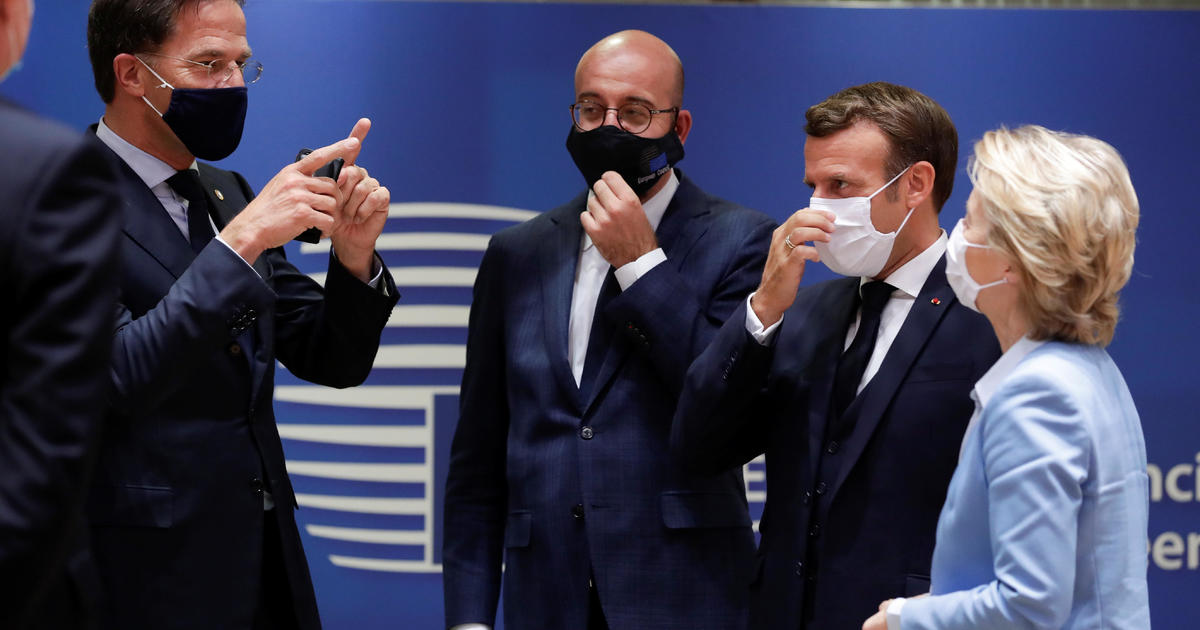Brussels — Weary but relieved, European Union leaders finally clinched a deal on an unprecedented 1.8 trillion-euro ($2.1 trillion) budget and coronavirus recovery fund early Tuesday, somehow finding unity after four days and nights of fighting and wrangling over money and power in one of their longest summits ever.
With masks and hygienic gel everywhere at the summit, the 27 leaders were constantly reminded of the potent medical and economic threat the virus poses to their continent, and grudgingly committed to a costly, massive aid package for those hit hardest by COVID-19.
“Extraordinary events, and this is the pandemic that has reached us all, also require extraordinary new methods,” German Chancellor Angela Merkel said.
To confront the biggest recession in its history, the EU will establish a 750 billion-euro ($858 billion) coronavirus fund, partly based on common borrowing, to be sent as loans and grants to the hardest-hit countries. That comes on top of the seven-year, 1 trillion-euro EU budget that leaders had been haggling over for months even before the pandemic.
“The consequences will be historic,” French President Emmanuel Macron said. “We have created a possibility of taking up loans together, of setting up a recovery fund in the spirit of solidarity,” a sense of sharing debt that would have been unthinkable not so long ago.
Dutch Prime Minister Mark Rutte, European Council President Charles Michel, French President Emmanuel Macron and European Commission President Ursula von der Leyen chat while wearing face masks during the last roundtable discussion following a four-day European summit at the European Council in Brussels, Belgium, on July 21, 2020.
Stephanie Lecocq/Pool via Reuters
Merkel said, “We have laid the financial foundations for the EU for the next seven years and came up with a response to this arguably biggest crisis of the European Union.”
With Macron and Merkel negotiating as the closest of partners, the traditionally powerful Franco-German alliance struggled for days to get the quarreling nations in line. But, even walking out of a negotiating session in protest together over the weekend, the two leaders bided their time and played their cards right.
“When Germany and France stand together, they can’t do everything. But if they don’t stand together, nothing is possible,” said Macron, challenging anyone in the world who criticized the days of infighting to think of a comparable joint endeavor.
“There are 27 of us around the table and we managed to come up with a joint budget. What other political space in the world is capable of that? None other,” Macron said.
At first, Merkel and Macron wanted the grants to total 500 billion euros, but the so-called “frugals” – five wealthy northern nations led by the Netherlands – wanted a cut in such spending and strict economic reform conditions imposed. The figure was brought down to 390 billion euros, while the five nations also got guarantees that grants had to be linked to economic reforms.
“There is no such thing as perfection, but we have managed to make progress,” Macron said.
The summit at the urn-shaped Europa Center laid bare how the nations’ narrow self-interests faced the obvious common good for all to stand together and face a common adversary.
Rarely had a summit been as ill-tempered as this one, and it was the longest since a five-day summit in Nice, France, in 2000, when safeguarding national interests in institutional reforms long was a stumbling block.
“There were extremely tense moments,” Macron said.
Still, considering every EU leader had the right of veto on the whole package, the joint commitment to invest and spend such funds could be seen as a success.
The days and nights of brutal summiteering will surely have leave many wounds among member states but, as history has proven, the EU has an uncanny gift to quickly produce scar tissue and move on.
“We all can take a hit,” said Dutch Prime Minister Mark Rutte. “After all, there are presidents among us.”
Even if Tuesday’s agreement was a giant leap forward, the European Parliament, which has called the moves of the member states too timid considering the challenge, still has to approve the deal.
